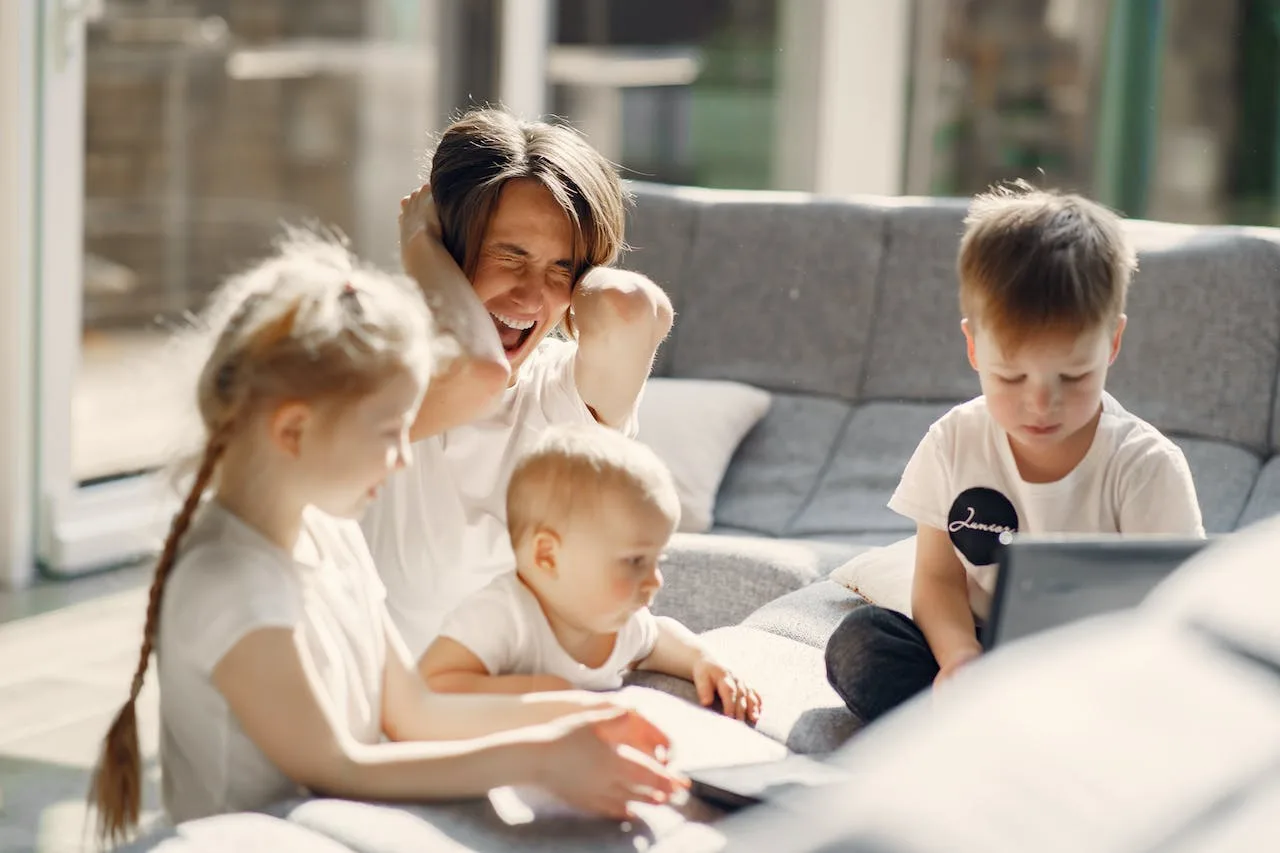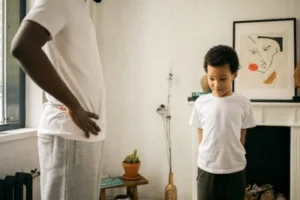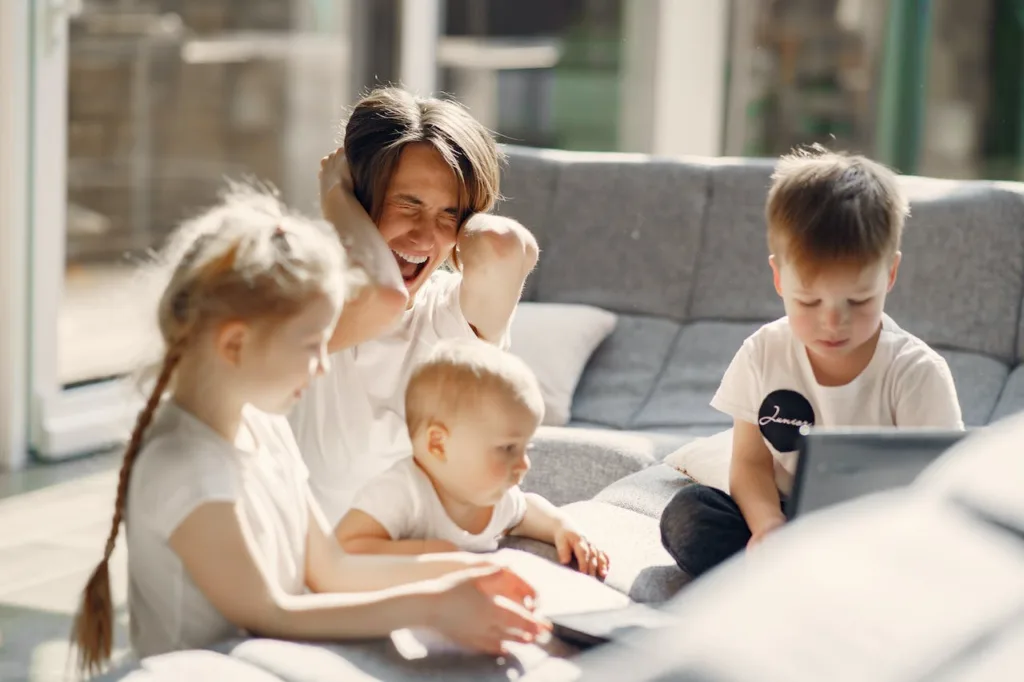
We all know children don’t come with instruction manuals. Even though there’s no shortage of books on child-rearing and child psychology, every child has their quirks and personality, and just when you think you’ve got a handle on parenting, they grow and change.
Whether you’re the primary caregiver for children in your home, share responsibilities with a spouse, or are lucky enough to have a capable and experienced au pair, kids can test your patience. It’s not uncommon to find yourself frequently yelling at your children out of sheer frustration.
Of course, most parents don’t want to yell. You don’t want to give in to anger and scare your kids in the process. You may feel shame after such behavior. If so, you might be interested in learning how to stop yelling at your kids. Here’s what you need to know to become more aware of this behavior and make positive changes for your family.
Why Do Parents Yell?
Whether your child misbehaves at home or makes dangerous choices out in public, you may find yourself yelling out of anger, frustration, or fear. When others see a kid getting yelled at, they may give you disapproving looks or even admonish you. Are they right? What makes you raise your voice, and is it ever okay?
Often, yelling is a side effect of feeling overwhelmed. Perhaps you let the stresses of a hard day get to you, or maybe your temper is short due to poor sleep. You might be dealing with emotional triggers related to a child’s behavior or something completely unrelated.
It’s essential to draw a line between yelling and verbal abuse. You may shout at children to stop unwanted activities, like repetitive noise-making or throwing food on the floor. Certainly, you might yell in panic if they behave in ways that could lead to harm, such as chasing a ball into the street.
However, if you regularly include name-calling or insults when you yell, you’re engaging in a form of verbal abuse. That could be linked to your childhood and the hurtful behaviors your parents modeled for you.
If you often yell at your kids, you should be mindful of when and why it’s happening. You can stop and explain your response to children when you catch yourself in the act.
That can help them understand that we all have negative emotions that sometimes make us act in unhealthy ways. You can also model good coping behaviors so kids learn to recognize and deal with anger and frustration.
What Does Yelling Do to a Child?
Children feel safe and reassured in calm, stable environments with consistent rules, rewards, and consequences. Yelling, especially if you do so regularly, can negatively impact your kids in several ways. You might naturally wonder, “Will my toddler remember me shouting?” Even if they don’t, it can change how they approach the world.
For starters, yelling can scare kids. It can cause them to feel hurt, sad, and angry, which may affect their behavior. Studies have shown that shouting at kids can stop unwanted activities in the moment, but it may increase aggressive behavior overall because that’s what they perceive as normal.
Yelling can also lead to significant mental and emotional health concerns, such as anxiety and depression. This stressor has also been linked to physical health issues, including chronic pain, that may not surface until later in life.
One study using MRI scans of the brain found that adults who suffered verbal abuse from parents had different physical responses when processing sounds and language, as opposed to adults who were not subjected to abusive yelling as children. That means it can have both immediate and long-term effects on kids.
I Yelled at My Toddler: What Next?
Adopting a zero-tolerance policy for yelling might not be entirely realistic. We all lose our cool at times because we’re human. However, toddlers are unlikely to understand the message, meaning they only absorb the emotion behind it. Kids of all ages might model your behavior, becoming aggressive themselves.
It’s important to apologize and reconnect with your children after yelling, and try to view mistakes as learning opportunities. Working to decrease shouting is a goal that anyone can accomplish with awareness, coping mechanisms, and a commitment to prioritizing better behavior.
Additionally, when you start to make changes, you can teach your kids how to deal with their own negative emotions. Here are a few practical suggestions for how to stop yelling at your kids.
10 Alternatives to Raising Your Voice
Learning how to not yell at your kids starts with becoming aware of your behavior in the moment and developing coping mechanisms that allow you to stop and make a different choice. Here are 10 practical steps you can take when you catch yourself losing your temper with your children:
1. Take a Deep Breath
Our lives are filled with various stressors, from deadlines at work and financial concerns to frustrations in our interpersonal relationships. While a small amount of stress can help drive focus and performance, long-term stress can have negative effects.
Yelling can release tension, but it’s not necessarily the healthiest option, especially when you’re shouting at kids and stressing them out in the process. Studies have shown that deep breathing helps to combat stress responses by increasing oxygen in the body, slowing the heart rate, and even stabilizing blood pressure.
It also lets you calm yourself and think clearly about your behavior and potential consequences. Also, provide stress relievers to kids to help them keep a balanced mindset.
2. Use a Calm Tone
If you want to know how to stop yelling at your kids, one great option is to change the inflection of your voice. When you catch yourself about to lose your temper, stop what you’re doing and consciously decide to practice different behaviors.
Start by lowering the volume of your voice and speaking in a calm, measured tone. That’s not always easy, but it will help you to remain calm and avoid raising your voice and scaring your kids.
3. Positive Reinforcement
 We’re all learning creatures, susceptible to different forms of reinforcement. One way to encourage good behavior for kids and adults alike is through positive reinforcement. That is a psychological technique used for behavior modification.
We’re all learning creatures, susceptible to different forms of reinforcement. One way to encourage good behavior for kids and adults alike is through positive reinforcement. That is a psychological technique used for behavior modification.
While you wouldn’t necessarily give yourself a handful of M&Ms every time you avoid yelling, there are ways you can reinforce the habits you’re trying to adopt. You could, for example, ask your child for a hug when you remember to speak calmly instead of yelling.
You could also set aside time to reward yourself with a coffee break, a hot bath, or other pampering that reinforces your good behavior. Rewarding children for good behavior will depend on what they like and respond to, which could be a little different for every kid.
4. Timeout for Yourself
Changing long-term habits can be challenging for parents who yell too much. You may get stuck in a vicious cycle of shouting and then feeling guilty and frustrated, leading to more yelling and negative emotions.
Sometimes, the best way to avoid harmful behaviors is to remove yourself from situations that trigger them. If you’re having trouble staying calm when you’re overwhelmed, simply walk away for a few moments so that you can take a deep breath and organize your thoughts.
5. Use Non-Verbal Cues
Humans have many ways of communicating with each other that don’t require speaking or verbalization. You can use these forms of communication even with babies and toddlers who aren’t speaking yet or are just starting to speak.
For example, you may want to try baby sign language. Teaching kids to sign words like “hungry,” “more,” “all done,” “help,” “yes,” and “no” can help with communication all around.
When small children can convey their desires, it avoids confusion and frustration, helping to minimize tantrums and other behaviors that can frustrate you. It also gives you a way to say no without shouting.
6. Set Clear Expectations and Consequences
 Raising your voice may be a response to your children’s bad behavior, but when you’re figuring out how to stop yelling at your kids, you need different options. One way to avoid this is to set clear expectations and follow through. You don’t need to make threats; you just have to make the consequences clear.
Raising your voice may be a response to your children’s bad behavior, but when you’re figuring out how to stop yelling at your kids, you need different options. One way to avoid this is to set clear expectations and follow through. You don’t need to make threats; you just have to make the consequences clear.
For example, before going to a public place like a restaurant or playground, you might tell kids if they act up by engaging in behaviors like running, screaming, or throwing things, you will immediately leave and go home. If unwanted behaviors occur, there’s no need to yell — simply follow through with the consequences you warned them of.
7. Practice Active Listening
When we speak, we don’t always say what we mean. For example, angry kids may shout, “I hate you!” even though you know they love you. That can be hurtful, and it may provoke you into yelling back.
Instead, engage in active listening, where you try to fully understand what kids are saying and what they mean. Consider the emotions behind their words and nonverbal cues that can tell you more. When you listen actively, you have a better chance of remaining neutral, empathizing with your kids, and finding healthier, more productive ways to interact.
8. Empathize With Their Feelings
Parents yelling at kids’ misbehaviors often struggle because they don’t try to put themselves in their children’s place. Think about how you might feel if someone significantly bigger than you yelled at you angrily.
Would you feel scared? Humiliated? Resentful? When kids act out in ways that frustrate you, try to understand what’s motivating their behavior so that you can come up with a positive and productive solution rather than yelling and making it worse.
9. Use “I” Statements
Conflicts that involve yelling can feature an accusatory element. When you focus on “you” while yelling, children may feel attacked, which can be hurtful and frightening.
Instead, try to focus on “I” statements and sort through the emotions that might prompt yelling. It’s okay to tell kids, “I feel frustrated and angry right now.” That helps to normalize the negative feelings we all experience.
You could continue by saying, “I’m going to take a deep breath and calm down before we continue this conversation.” This models healthy coping behaviors in both words and actions, helping to encourage positive behaviors your children can adopt when they feel frustrated.
10. Engage in Problem-Solving Together
You don’t have to be the only one involved in improving your relationship with your kids. One aspect of how to stop yelling at your kids is including them in the repair process by problem-solving together.
Suppose your typical response to kids jumping on the couch is to yell at them to sit down. Instead, you might ask them to think of other activities that could be fun instead of jumping on the couch, such as running and playing outside. In this way, you can feel good about coming up with positive solutions that benefit everyone.
Get the Support You Need With the Help of an Au Pair
The dynamic of a parent yelling at a kid’s behavior can be challenging to break, especially when children develop behavior issues and you don’t fully understand why. One reason could be that you’re overworked and overwhelmed and don’t have much extra time to devote to your children.
That is where an experienced au pair can help. These professionals provide a level of support and relief that can ease some of your stress and help you develop and implement a parenting plan to improve your child’s behavior, even as you work on your own approach.
When you understand why parents yell and how it affects kids, you can develop effective strategies for change — and a seasoned professional from Go Au Pair can offer the support your family needs during this process. Find an au pair through a reputable au pair agency today!



